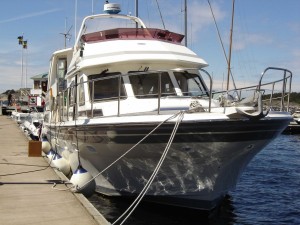Boat Cleaning and Maintenance After Saltwater Exposure
 It’s no secret that saltwater can wreck havoc on a boat’s hull, engine, and its mechanical and electrical components. With the exception of fiberglass, the fine salt particles will stick to the metal where it promotes rust and corrosion. In addition, it can also settle into small spaces where it expands and crystallizes, damaging things like jam zippers and fasteners.
It’s no secret that saltwater can wreck havoc on a boat’s hull, engine, and its mechanical and electrical components. With the exception of fiberglass, the fine salt particles will stick to the metal where it promotes rust and corrosion. In addition, it can also settle into small spaces where it expands and crystallizes, damaging things like jam zippers and fasteners.
Does this mean you should avoid exposing your boat to saltwater? Not necessarily, but if you’re going to take your boat on the ocean, makes sure you clean it afterwords. Failing to properly clean and maintain your boat after exposing it to saltwater may lead to serious damage or even equipment failure.
Wash Your Boat Immediately!
Once you get back from a boating excursion on the ocean, you should immediately wash your watercraft down with freshwater. Saltwater is similar to mud in the sense that it’s easier to clean while it’s still wet and fresh. If you procrastinate and wait until the following day, the water may evaporate, leaving behind coarse salt particles stuck to your boat.
Hose down your boat with freshwater and marine boat soap, paying close attention to areas of exposed metal. If you don’t have access to high-pressure water hose, take your boat to a do-it-yourself car wash station.
Note: it’s not a bad idea to apply a coat of wax to your boat’s hull once or twice a year. This will help protect against salt, ultraviolet (UV) light, corrosion, and other forms of damage.
Flush The Engine
After rinsing your boat with freshwater, you should flush the engine to ensure there’s no salt lingering behind. Even small trace amounts of salt can take its toll on an engine, corroding gaskets and other critical components. It should only take a couple of minute to flush your boat’s engine, but doing so will help protect it against damage caused by exposure to saltwater.
There are products designed specifically for flushing saltwater from boat engines, such as Salt-Away, but freshwater and a little bit of soap should suffice in most situations.
The key thing to remember when boating on the ocean is to clean your watercraft in a timely manner. The longer you wait, the more it will harden and the greater risk of it causing rust to your boat. If you wash the hull and flush the engine within 24 hours, though, your boat will remain clean and ready to hit the ocean again on your next adventure.
